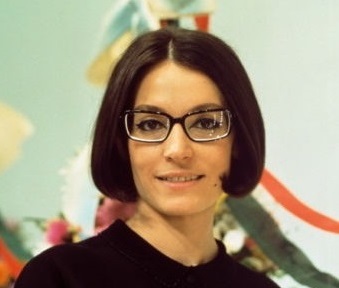
"Nanourisma"
A lullaby and a romance

Several songs marked Nana's career for different reasons. Some are autobiographical. Others were big sales success or have been translated into several languages. "Nanourisma", better known as "Quatre soleils", is the one that introduced Nana somewhere in North America. Let us review its origin, its adaptation and each of the translations (in Greek, French, German and Italian). We are also going to ask ourselves about a possible English version before devoting a paragraph to Nana's favorite composer.
ORIGIN The original title, "Nanourisma", is a theme from the 1963 film "Aliki my Love". This Greek-English production starred Alíki Vouyoukláki, the most popular Greek actress of the time. In addition to being pretty, she could dance and sing. Filming took place in English and the songs were performed in Greek. This sentimental comedy tells the story of a young heir living on an island. He met a young woman and her mother who held an unexpected secret that could make everyone's dreams come true.
|
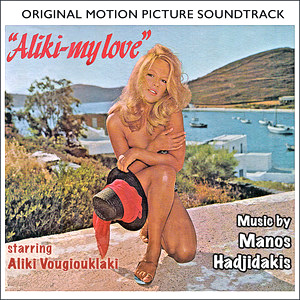 |
ADAPTATION
In the film, Alíki Vouyoukláki performed "Nanourisma" with Jess Conrad. The musical accompaniment was light with guitar, piano and xylophone. The song was also released on a record. After seeing the film, Nana decided to record it. She did the original version, in Greek, with her ensemble The Athenians who sang with her. The others, with the orchestra of Michel Legrand. In order to preserve the Greek sound, the bouzouki was distinguished from all instruments. Note that the film includes three other titles that Nana has recorded in different languages: "An einem fernen Ufer", "Oh, Mama Mama" and "To live without your Love". They are all compositions by Manos Hadjidakis.
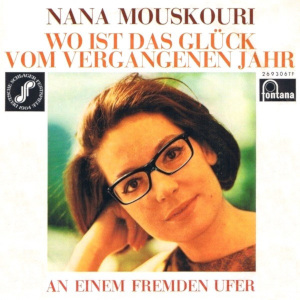

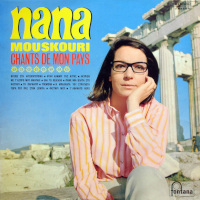
|
NANOURISMA In Greek, the lyrics are by the poet Nikos Gatsos, a very dear friend of Nana. These are slightly modified for the version recorded with The Athenians. As the title indicates, it is a lullaby. It evokes the king's son and grandson, the lilac and the swallow, the star and the virgin. The song was released in the album "The Voice of Greece", in October 1964, in view of her first American tour with Harry Belafonte. It will reappear forty years later on the CD "Mes plus belles chansons grecques" published for her French Integral. Listening to this recording, we let ourselves be lulled by the melody and Nana’s interpretation. Without hesitation, we can say that it is the theme of the film that best suits her voice. |
QUATRE SOLEILS "Quatre soleils", the first version of Nana, was released in July 1964 on a French EP. Four months later, on a Canadian single. This song attracted the attention of Quebec radio stations, which broadcasted it daily. From then on, we got the record to listen as many times as desired to this new voice from the South. Lyricist Eddy Marnay did of it more a sentimental ballad than a lullaby. He chose the sun, the day star, to represent happiness and there are four rather than one. Whether it’s morning, day or night, on every horizon a sun is shining. With her melodious voice, Nana tells that their Love has only just begun, that they live more than a romance and that they will love each other longer than ever. What could be better than a beautiful melody accompanied by touching words!
|
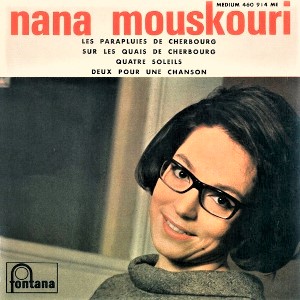 |
|
SCHÖN IST DAS LEBEN NUR ZU ZWEIN In German, the title follows the idea of the French version: "Life is only beautiful together". With the text by Peter Lach, she wonders why she was alone for so long. For this reason, she offered her heart to her lover and he, a golden ring as a pledge of fidelity. "Schön ist das Leben nur zu zwein" was edited in January 1966 on her second German LP. This potential song was therefore not released as a single like the previous ones. |
IN ITALIAN In Italian, Nana recorded the two themes: the lullaby and the romance. The titles: "Dormi mio caro amore tu" (Sleep my dear, I love you) and "Nessuno piu' di me" (Nobody more than me). However, both versions remained unreleased. Was the choice too difficult to make? Her compilation "In Italia" was therefore released without it. |
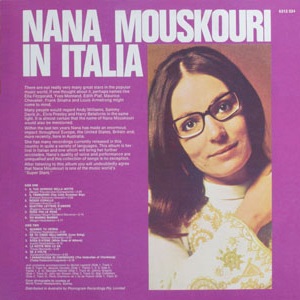 |
ENGLISH VERSION?
Since during these years Nana recorded her main successes in several languages without necessarily releasing them all, it is quite justified to believe that she did it in English. Especially because on the records and covers, it is mentioned "Aliki my Love". Besides, how could she have recorded two versions in Italian without making one in English? That said, if the song has been covered by another performer, it must have a different title because on the Internet there are no results.
FAVORITE COMPOSER
After presenting another song by Nana, why not dedicate a paragraph to its composer Manos Hadjidakis? He is considered as the leader of the Revival of the Greek song scene since he brought a new sound to his music by adding bouzouki.
Nana owes him most of her first Greek songs. Some, like "Kapou iparhi i agapi mou" and "To kyparissaki", won her the first prize at the Greek Song Festival. While others, like "Nanourisma", had more impact in other languages. Hadjidakis was a real genius. He was prolific. But he had fixed ideas about his arrangements and did not always approve Nana's adaptations with other musicians. However, he remained her favorite composer. And, over the years, she has performed his songs on stages throughout the world. |
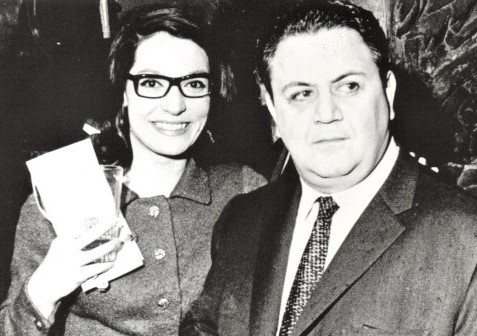 |
A SONG THAT MEANS A LOT
Without necessarily being Nana's greatest success, "Quatre soleils" is a song that means a lot to her and that touched her audience. Its release came at an opportune time. In particular, it marked the beginning of a long love story with Quebec where, for 25 years, her radio successes followed one another. Even in France, it is one of the first successes that really started her career. And, five versions of the same song, that’s no small feat... whether it's the lullaby or the romance.